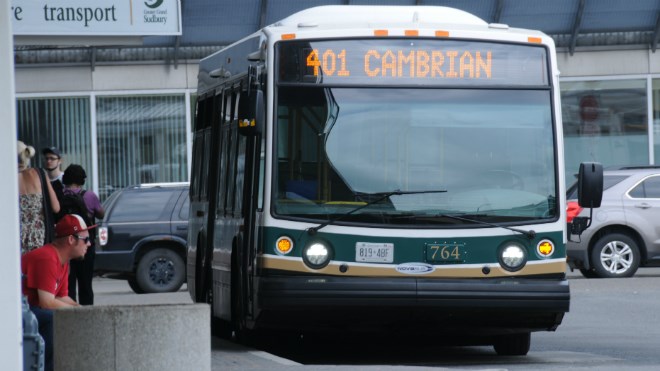Following a string of assaults on Greater Sudbury Transit operators, city council has voted to spend $275,000 installing security cameras on the city’s fleet of 60 buses.
As someone who has worked in health and safety at the city, Mayor Marianne Matichuk said the importance of protecting workers shouldn’t be underestimated.
“Our employees are not punching bags,” said Matichuk after Tuesday’s city council meeting.
An ad hoc committee of city staff, union representatives, police and city councillors met last Friday and will meet again to come up with a strategy to protect drivers, she said. The spirit of co-operation was impressive, she added.
“It was a very productive meeting, a very encouraging meeting,” she said.
“Everybody was willing to come up with solutions and ideas ... What we're seeing tonight is just the first step that will lead to improved safety of transit drivers and customers — both on buses and at the downtown transit terminal.”
While there have been four cases of drivers being punched in the last few months, other, less serious cases are common, such as drivers being verbally abused and even spit on.
Ward 2 Coun. Jacques Barbeau, who chairs the city’s operations committee, said cameras have proven effective in other cities and are becoming the norm. While significantly reducing attacks – as much as 25 or 30 per cent - the cameras won't curtail misbehaviour from drunk or drugged passengers.
“But it will stop many other assaults on buses,” Barbeau said. “And quite frankly, it's going to give us the evidence at the end of the day to lay charges.”
Ward 3 Coun. Claude Berthiaume wondered how many cameras would be installed on the buses. Tony Cecutti, the city's general manager of infrastructure, said the range will likely be between 4-7 cameras per bus, but that won't be determined until the contract tender is awarded.
“We're looking forward to having the providers let us know what the latest available technology is, the opportunities available and how much that will cost,” Cecutti said.
Berthiaume also wondered whether the cameras would be continually pointed at drivers. That would be intimidating to any worker, he said.
“I know we're in the era of big brother, but I think we should look at this and review this,” he said. And for someone drunk or on drugs, “the camera isn't going to matter.
“I think we should be looking at some kind of barricades, at least for night shift.”
But Barbeau said those types of decisions should be made by the special committee. It met for the first time June 21 and will meet again soon to begin working out details of the best way to protect drivers.
“This is not the time, this is not the place to be having those discussions, quite frankly,” Barbeau said. “We'll come to the best result at the end of the day.”
A staff report on the cameras said reports from a recent national transit conference held in Newfoundland made it obvious “that all transit properties are dealing with the issue of operator and passenger safety.
“Surveillance cameras have become a standard piece of equipment in buses for many transit properties and have enhanced the safety of operators and customers for those cities,” the report said.
“The CAO, staff, council, the union, health and safety, police and operators have all committed to working together to make our transit system safe for our operators and customers.”
The report recommends making the cameras standard on all new buses, as well as installing them on all current buses. Advantages include:
Driver safety - protect your drivers, monitor passenger behaviour;
Reduced litigation costs - objective witness, allowing you to see what happened, and assist on case building, stop false claims, accident reconstruction;
Driver training - ability to positively reinforce proper procedures and techniques; and,
Vandalism - often a reduction in bus damage when passengers know video exists.
